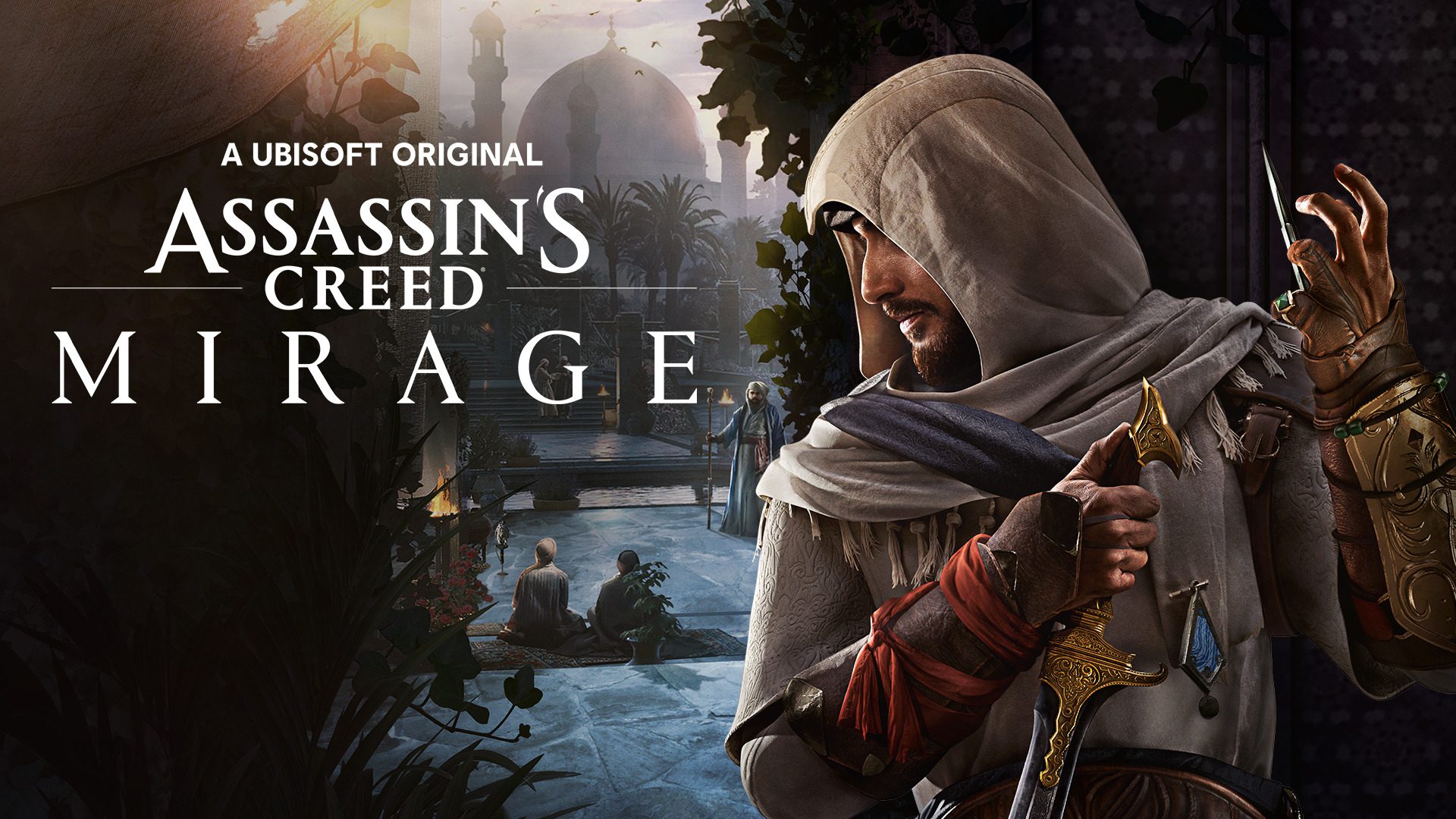REVIEW: Assassin’s Creed Mirage (2023)
Assassin’s Creed Mirage: the game that Ubisoft claimed would be a return to the classic formula of the franchise. After completing the game’s base story, I can unequivocally say that the marketing was an outright lie. Mirage bears no substantive connection to the classic games of the franchise, and what aspects of its predecessors that it attempts to imitate fall short of achieving basic competency. Mirage bores far more than it entertains. The Assassin’s Creed games with which Mirage shares the most similarities are Origins and Valhalla because of the desert environment and map construction similar to Origins, and the UI, engine, and many gameplay mechanics of Valhalla. Adding a few traversal items to climb throughout the map and setting the game in the same rough time and location as the first Assassin’s Creed is insufficient to claim “back to the formula.”
**SPOILERS**
As much as Assassin’s Creed Valhalla initially fascinated me with its epic opening and expansive world-building, the ultimate conclusion to the story left it as one of my least favorite entries into the franchise. Mirage only compounds the many issues of Valhalla, especially its story. Basim was already an uninteresting character. Now, he is in the running for the worst character in the franchise’s history, only beaten out by Nehal, who was introduced in Mirage. With the revelation in Valhalla that Basim was the reincarnated Norse God Loki, who was actually an alien and member of the ISU species, the prequel following his young life was bound not to make much sense. Mirage barely attempts to acknowledge or set up the Loki reveal and goes for a mental health angle instead. That leaves the story and the connective tissue between games feeling scattered and uninspired.
On top of the manipulative marketing and the horrific starting point for the character forced upon this game by Valhalla, Mirage also suffered from a desire to be a soft remake of the original Assassin’s Creed game. If the marketing claiming this game would be a return to formula had not been a lie, this attempt would have been slightly more forgivable. However, from the horrendous writing, terrible gameplay, and the craptastic design of Mirage, this desire stands out like a sore thumb. There were far too many goals for Mirage, dooming it to failure and resulting in a mass of the game.
Going into Assassin’s Creed Mirage, I expected it to be an overall disappointment, primarily because of the press releases, the idea of Basem being the main character, and the terrible ending to the Valhalla story. However, I still expected the gameplay, the traversal system, and the combat to be engaging and exciting enough to garner at least a level of praise from myself to the point where I could recommend it to gamers who do not prioritize the story of a game to the same degree that I do. That expectation was thoroughly subverted upon playing Mirage, as I discovered that virtually no aspect of Mirage was worthy of praise. Even the gameplay, the traversal system, and the combat were horrific, and the story was far worse than even I had predicted it would be. In this review, I will break down the individual parts of this game in greater detail. Still, I thoroughly do not recommend this game to anyone. It is not worth anyone’s time or money, whether they are fans of the franchise or newcomers to Assassin’s Creed.
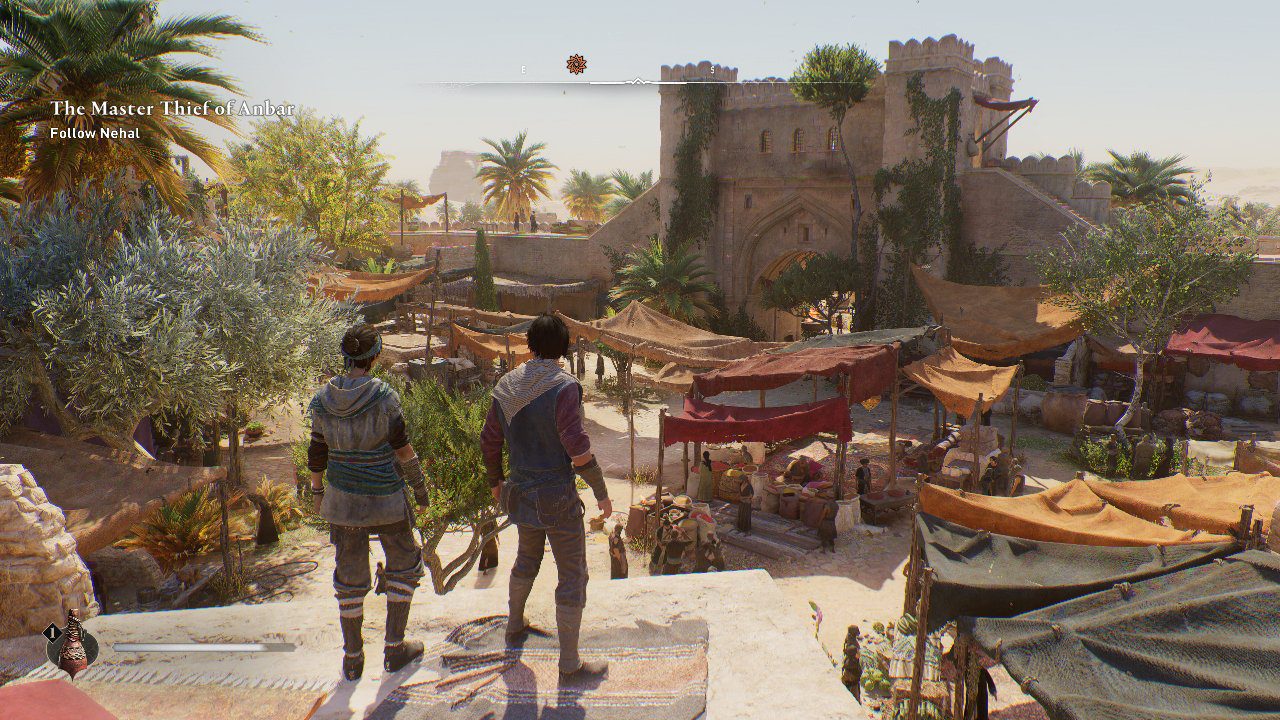
Graphics are rarely a high priority for me when it comes to my enjoyment of a video game. As such, I should not be taken as an authority on the graphics of any game. However, I do have some thoughts. Generally, the graphics of Mirage are passable. They are a downgrade from Valhalla and Odyssey’s incredible graphics but feel generally in line with Origins. Despite the decrease in quality from recent entries in the franchise, it appears that Mirage was created using the same engine as Valhalla, as it bears many similarities to Valhalla’s UI and general look.
That said, Mirage does fail in several aspects of graphical design. Because of a bland color palette, the game feels boring and uninteresting. Those claiming this color palette is justifiable because of the desert setting should look back at Assassin’s Creed Origins, Revelations, and Assassin’s Creed 1, all of which took place at least partially in more desert conditions and more bland-seeming environments. Yet, all three managed to create a fascinating, beautiful, vibrant world. Mirage does not appear beautiful or intriguing in the least.
The worst problem with Mirage’s graphics is the characters’ facial animations. Many Assassin’s Creed games have managed to create incredible facial animations that perfectly match the performances of great actors, pulling gamers into the story and the characters. The facial animations of Mirage are virtually nonexistent and often contradict whatever small performance the actors occasionally give.
In one scene, in particular, during the finale of Mirage, where Nehal’s secret identity is revealed to Basim, the actor’s voice breaks with emotion, poorly acted as it may be. However, Basim’s face barely changes expression, his mouth moving as if he were just chatting small talk with Nehal. Assassin’s Creed Black Flag, a game that is ten years old at this point, had far better facial animations that made the audience love the characters and invest in their stories. Mirage makes this impossible for countless reasons, especially the poor facial animations.
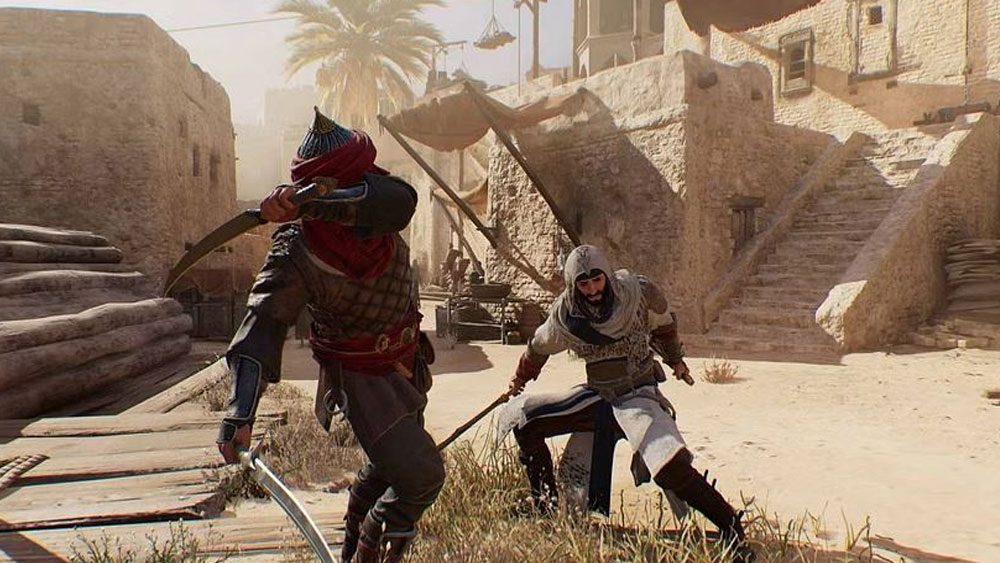
Despite my criticisms of Assassin’s Creed Valhalla, it had one of the greatest combat systems in any RPG. The combat was engaging and always felt epic and perfectly challenging. The player could feel the weight of every blow landed. Every previous Assassin’s Creed game had beautiful combat, whether in the RPG trilogy or the more traditional games. The combat in the Ezio Trilogy through Unity felt like a dance as the playable character weaved through opponents. Counter-based combat has always been a significant aspect of the combat of the franchise but not the sole option for most conflicts. Mirage’s combat is a major step down from Valhalla and the franchise as a whole. For a game that shared most of its similarities with Valhalla, the one thing that would have been great to continue from Valhalla was the main thing they did not carry over. Counterattacks are the only option for 90% of the combatants in Mirage. Your sword does virtually nothing. This leaves combat feeling bland and pathetically easy for the most part.
Your sword is even more useless when it comes to the brutes, with how heavily armored they are. However, counter-based attacks are not effective against brutes as brutes rarely use counterable attacks. Your best chance at beating a brute is to dodge around and hit it in the butt or throw daggers at his feet. While brutes are substantially more difficult than the average opponent and more difficult than any boss battle, the strange nature of the effective combat is entirely immersion-breaking.
Perhaps the saddest part of combat in Mirage is the boss battles, if they can even be called boss battles. Many of the Order members Basim hunts throughout the game can be classified as mini-bosses. Yet, they are all far easier than the brutes. The only combat that can be called a boss fight is when Basim fights Roshan at the end of the game. However, even this boss fight is far easier than a brute. Half of her health is taken away once the player throws a knife at Roshan. Then, simple dodge attacks will whittle her down quickly, your sword finally doing something. This boss fight is, without doubt, the least climatic and challenging boss fight of the entire franchise.
For the combat of Mirage, your options are bland and easy counters, bizarre brute fights, or the saddest boss battles in the franchise’s history.

As previously mentioned, this game feels like an extended DLC for Valhalla, at best. Even still, the 15-hour base game runtime feels exorbitantly long because of the incredibly slow traversal and parkour mechanics. Between pointless fetch quests and the endless slog of the slow traversal, the game’s runtime is padded out substantially. If Mirage had the traversal and parkour systems of any previous Assassin’s Creed game, its runtime would be reduced by many hours. Valhalla definitely had one of the strangest-feeling parkour and traversal systems in the franchise. Yet, it still moved at a brisk enough pace that it was not distracting or aggravating. Instead of going back to form, as Mirage’s marketing so often claimed, the traversal felt most similar to Valhalla, with the main difference being the feeling that it had been dipped in molasses.
Many people are excusing Mirage’s slow and aggravating traversal system by saying it is very similar to the original Assassin’s Creed game. That is a very unfair excuse. Assassin’s Creed was the first of its kind, revolutionizing stealth and parkour mechanics in the video game industry. With such a breakthrough, it is expected that much polishing will need to be done in the future when the budgets are higher after a successful first entry. That is what happened in Assassin’s Creed 2, which fully perfected the system that began in Assassin’s Creed. As such, it can sometimes feel like the traversal system in the first Assassin’s Creed game has not aged well. There is nothing wrong with that. That first game gave us something extraordinary that many other franchises would seek to imitate. Using the experimental feeling of the first Assassin’s Creed game as an excuse for Mirage being awful, after fifteen years and nearly fifteen games perfecting the traversal system, is incredibly lazy and downright asinine. Ubisoft just made a bad game and claimed it was back to formula or retro to cover up how awful their traversal system was.
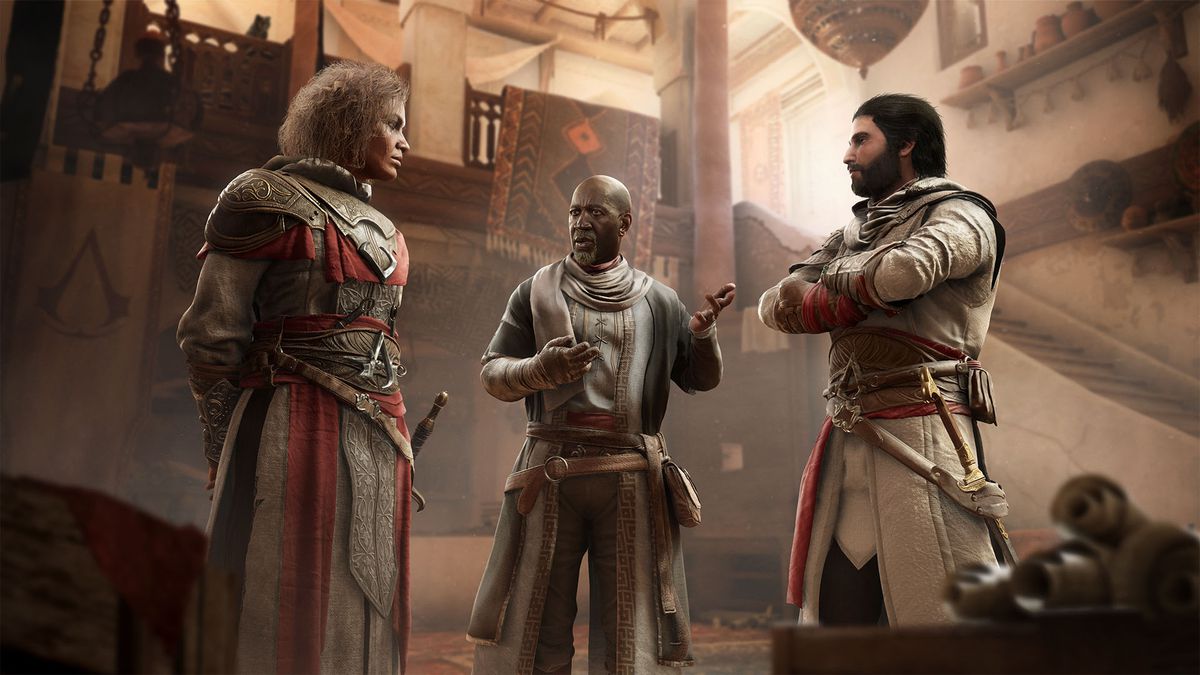
Hardly anything of substance occurs in the story of Assassin’s Creed Mirage. I struggle to say it has a plot at all. 90% of the game is pointless fetch quests. What little story there is in Mirage is poorly acted, with some of the worst dialogue ever to be included in a video game. Even the worst entries in the franchise far outpace Mirage’s lackluster and anti-climactic narrative. Ubisoft appeared to hope that the return to formula lie on top of the occasional member berry would be enough for users to ignore the travesty that is the Mirage story. Perhaps that will work on the occasional gamer, but it is not nearly enough for me to forgive the soulless and hollowed-out farce of a narrative and caricatures of people that Mirage presents.
The Assassin’s Creed franchise is known for its bombastic and epic openings. From Brotherhood’s villa assault to the shipwreck of Black Flag to the battle of the 300 in Odyssey, this franchise has always delivered spectacular beginnings that immediately invest the gamer in the world and story. Mirage fails from its very opening. Rather than exploding to life in grandiose fashion, it stumbles onto screens like a drunken father after a weekend binge. Instead of epicness, the player is more likely to feel pity for how patheticly Mirage begins. Instead of an incredible and engaging opening to the game, Mirage starts with Basim stumbling around and being led by the nose by a girl boss who is better than him at everything. This girl boss character is made all the more ridiculous upon the revelation that she is merely another identity within Basim.
Not only does Mirage not start with anything epic, but it never delivers anything epic whatsoever. Between the countless fetch quests, the occasional fortress assault barely ekes out a modicum of interest above the norm. Nothing exciting occurs whatsoever.
For the plot as a whole, I struggle to describe the game’s events in any exciting fashion. I could describe every previous game in a couple of sentences that effectively encapsulate the story to intrigue hesitant gamers. For Mirage, I can barely even describe the plot, let alone make it sound interesting. As best as I can summarize without harping too much on the constant Aladdin references:
A dumb Aladdin-like kid gets himself into trouble and then decides to murder everyone who wasn’t OK with him trespassing and murdering a prominent government official before he finds out that he’s a reincarnated alien with dissociative identity disorder.
What plot there is between hours upon hours of fetch quests doesn’t make any sense and is built on nonexistent character work and the flimsy intelligence of the game’s writers.

Basim is a widely inconsistent character. At some points, he’s the subservient little bitch-boy doing whatever the strong, independent women around him say, particularly Nehal and Roshan. Other times, he merely exists, displaying virtually no emotion or character whatsoever, either by a lack of performance or a lack of competent dialogue. Until the sudden turn in his character during the finale, which went from zero to 1000 with no buildup, I can’t tell you anything substantive about his character or his motivations. Basim is best described as a blank block of wood. He is unequivocally the most uninteresting and poorly made protagonist in Assassin’s Creed history.
What little character work that they attempt to do is often contradictory, asinine, or wildly incomprehensible. Throughout the game, Basim is dreaming and hallucinating about a genie, which is basically a creepy mummy. This vision doesn’t progress after he starts seeing it during the day (while engaged in major assassinations) until the end of the game, once he suddenly realizes exactly what it is and rejects it before accepting the strong, powerful woman within himself, Nehal. That is what passes for character development in Mirage.
I cannot describe his character further, as there is no character to really discuss.
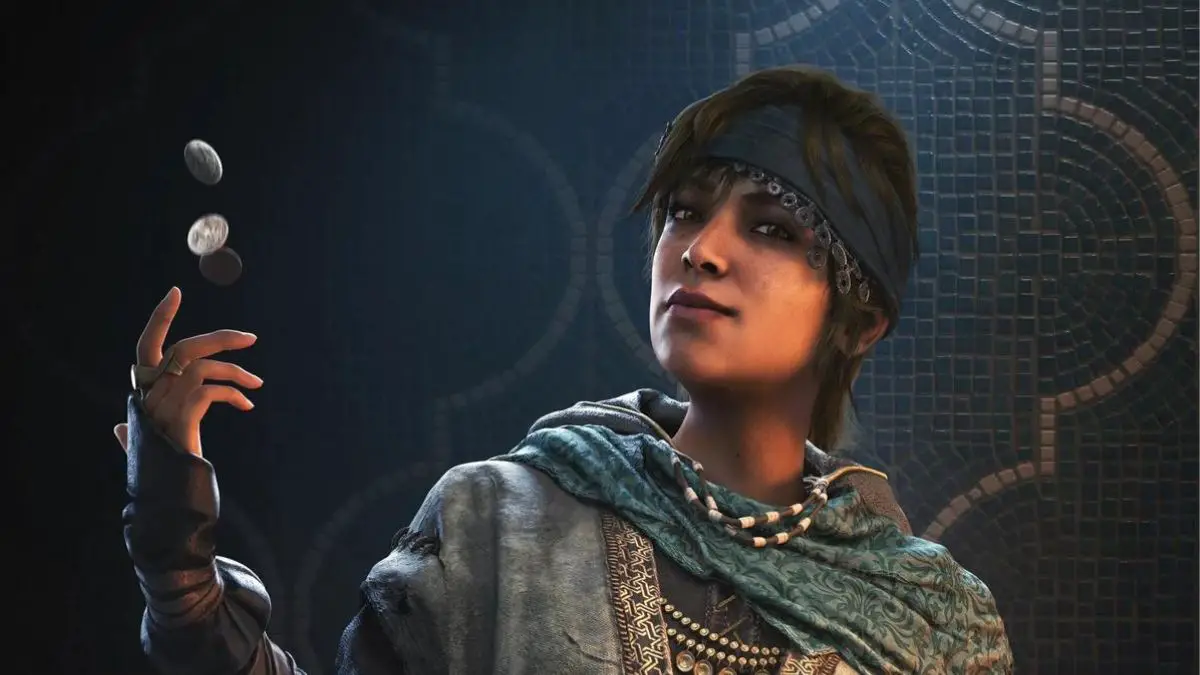
A character who was equally as poorly written but far more insufferable than Basim, Nehal started out as Basim’s childhood best friend who was a know-it-all and perfect at everything, bossing Basim around and leading him by the nose. She is constantly berating, mocking, and one-upping him. Near the beginning of the game, it is believed that she is responsible for the local ruler’s death, leading to countless innocent people’s deaths. Instead of feeling guilty for or concerned by all the death, she shrugs it off with no care or concern. If she were portrayed as a villain, this characterization would have worked, but it’s inconsistent with how Basim sees her throughout the entire game, describing her as the best person he knows and so much better than him in every way. This could have been slightly forgivable with the revelation made at the end of the game that she was merely another personality within Basim. However, Basim never judges those negative aspects of himself or recognizes her behavior as wrong and downright vile. He specifically says it’s the part of him that he has been rejecting and needs to embrace. After he embraces her, he doesn’t become a villain; he becomes content with his mind passing beyond the ordinary humanity of the era.
While Basim does have an adverse reaction to seeing all the innocent people killed, once he realizes that Nehal is a piece of himself, he does not recognize her behavior as wrong nor move the necessary guilt and regret onto himself. This is an example of inconsistent character writing. His anger at Nehal initially was the best character moment for him but was later destroyed by his reaction to the revelation of her true identity.
Nehal is nothing more than a caricature of the perfect badass girl boss.
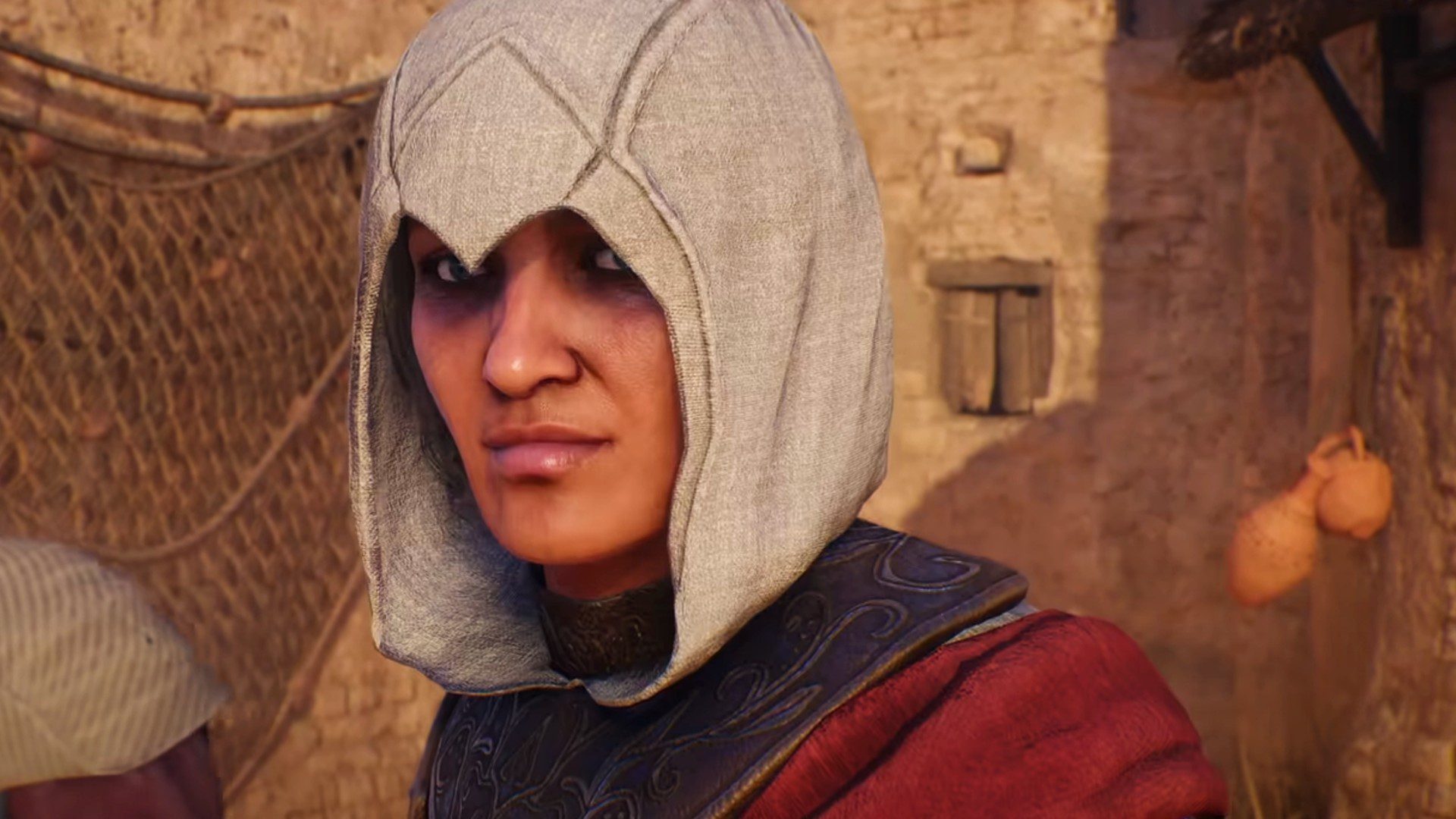
From the moment Shohreh Aghdashloo, the actress for Roshan, was cast, I knew that her character would wind up being the villain of Mirage, justifiably or not. Aghdashloo is one of the biggest and most prominent actors to join the franchise. It is entirely cliché at this point, but when such a standout performer is chosen, they are most likely the villain if they do not play the lead character. That prediction was proved entirely correct when Roshan revealed herself as the final boss battle. There is very little character development and minimal setup for her sudden villain-esque turn. What truly damaged her throughout the game was her stupid strategy, horrific advice, and willingness to entrust the Hidden Ones’ primary objective of hunting Order members to one of the newest assassins, if not the newest. Any moment when she seems like she might be able to help Basim, she leaves for no apparent reason and pops back up at the end of the quest. Roshan is inconsistent and hollow, with nothing interesting about her besides her gravelly voice and very mannish features.
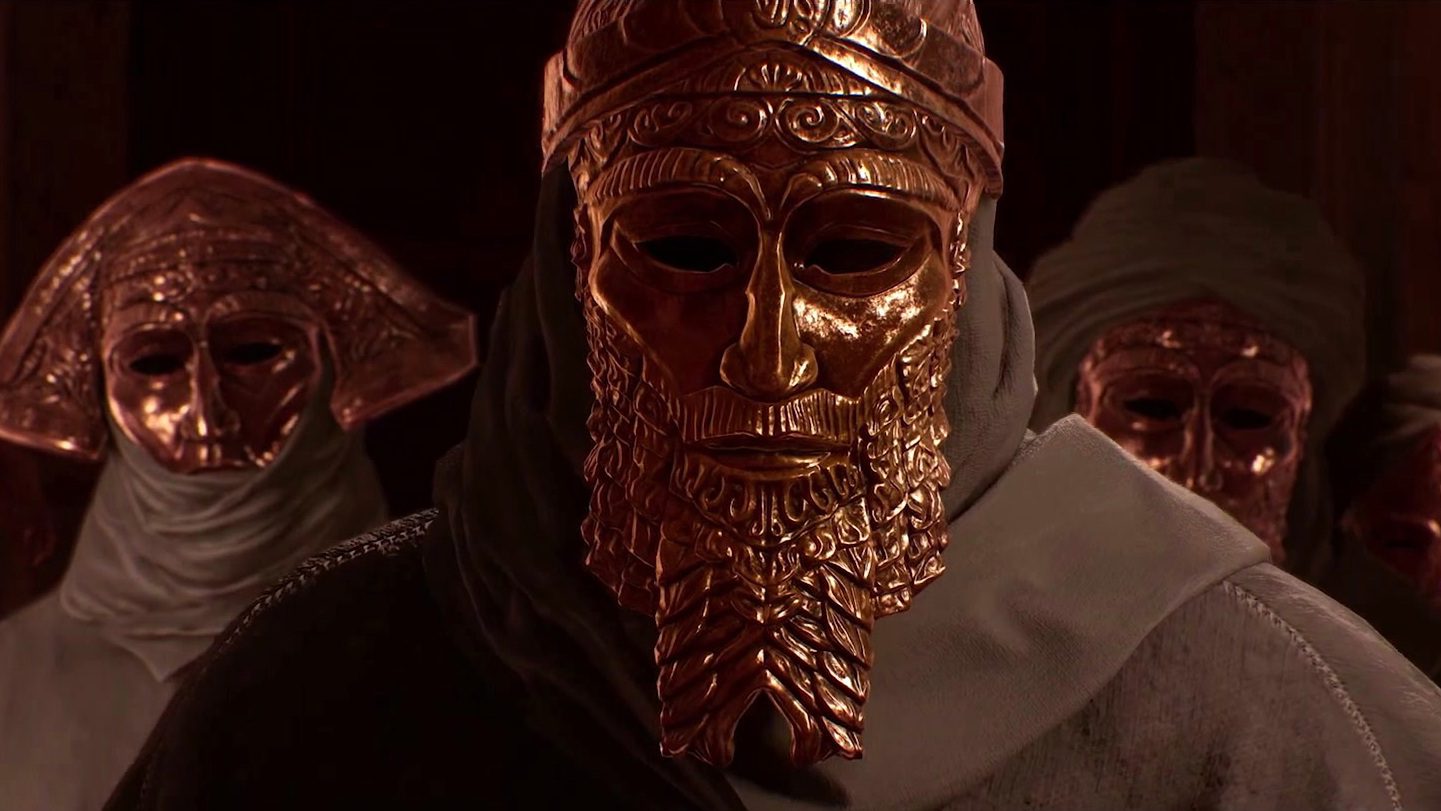
When it comes to the Order hunting, the majority of the quests are shallow, featuring Basem going to a place, reading some documents, finding out where the Order member is, and heading off to kill them quickly. All the Order members are empty characters with near-zero characterization. The sudden reveal of the Order members’ leader out of the blue with no setup or character development is jarring at best. The Caliphate was terrified of the Order and subservient to it, acting like it was a power far more influential than himself. But it was his wife who was the leader of the Order all along? That appears inconsistent and strange. Even the Order hunting, which should have been the game’s most exciting and challenging aspect, boils down to boring fetch quests that end in bizarre assassinations.
The Order member that stood out the most was one of the first I encountered. Throughout the game, everyone seems to know who the Hidden Ones and the Order of Ancients are. It’s an open secret. Yet the characters still act as if they are secret and their operations should be hidden. Despite this, and the reminding of stealth by Roshan, Basim decides to execute this Order member by wrapping a rope around his neck and throwing him from a balcony into a crowded market before landing directly below the Order member in full view of everyone. I have rarely seen such a public assassination in the franchise. Perhaps the developers thought the cool factor of the kill would excuse the inconsistent world-building, the insane strategy, and the baffling character work presented by this assassination.

In summation, Assassin’s Creed Mirage is a bland and soulless entry in the franchise that is not worth the full price of a game. At best, Ubisoft should have charged DLC price and incorporated the game into Valhalla rather than padding the game time out to an exorbitant and empty degree to justify the higher price. Mirage is a waste of time and money. It’s a craptastic bore fest that left me praying for its end. The best praise I can give the game comes from its innovation of the eagle sense. Adding the line of sight for combatant NPCS was an interesting feature that I see as an overall improvement, though a minor one. Besides that, I struggle to find anything of value in the game.
Assassin’s Creed Mirage (2023)
Gameplay - 3.5
Difficulty/Length - 2
Story - 1
Graphics - 5
Sound Design - 6
3.5
Awful
ssassin's Creed Mirage is a bland and soulless entry into the franchise that is not worth the full price of a game. At best, Ubisoft should have charged DLC price and incorporated the game into Valhalla rather than padding the game time out to an exorbitant and empty degree to justify the higher price.

